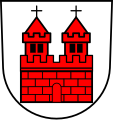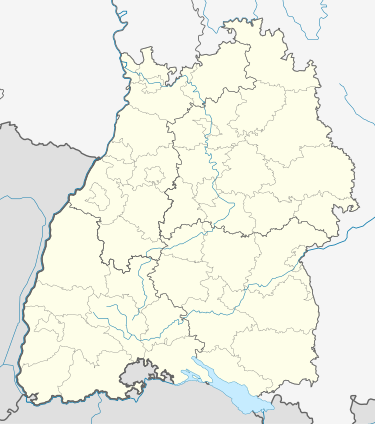Bollschweil
You can help expand this article with text translated from the corresponding article in German. (February 2009) Click [show] for important translation instructions.
|
Bollschweil | |
|---|---|
 The town hall of Bollschweil | |
Location of Bollschweil within Breisgau-Hochschwarzwald district  | |
| Coordinates: 47°55′14″N 07°47′21″E / 47.92056°N 7.78917°E | |
| Country | Germany |
| State | Baden-Württemberg |
| Admin. region | Freiburg |
| District | Breisgau-Hochschwarzwald |
| Government | |
| • Mayor (2022–30) | Jörg Wagner[1] |
| Area | |
| • Total | 16.42 km2 (6.34 sq mi) |
| Elevation | 328 m (1,076 ft) |
| Population (2022-12-31)[2] | |
| • Total | 2,277 |
| • Density | 140/km2 (360/sq mi) |
| Time zone | UTC+01:00 (CET) |
| • Summer (DST) | UTC+02:00 (CEST) |
| Postal codes | 79283 |
| Dialling codes | 07633 |
| Vehicle registration | FR |
| Website | www.bollschweil.de |

Bollschweil is a municipality in the Breisgau-Hochschwarzwald district, Baden-Württemberg, Germany, located approximately 10 km south of Freiburg.
History
[edit]The earliest surviving written record of the settlement appears in the records of the monastery at St Gallen, dated 838. At this time Bollschweil was named Puabilinisvilare. The town's subsequent history is closely entwined with that of the aristocratic Snewlin-Bernlapp family, a branch of the Snewlin family which was extremely influential throughout the Breisgau region. When, in 1837, the Snewlin-Bernlapps died out, the castle and settlement came into the hands of the von Holzing-Berstett family, whose descendants still inhabit the castle.
Between 1087 and his death in 1093, Ulrich of Zell established here the Priory convent of St Ulrich in the Black Forest, but this was relocated to Sölden in 1115.
References
[edit]- ^ Bürgermeisterwahl Bollschweil 2022, Staatsanzeiger.
- ^ "Bevölkerung nach Nationalität und Geschlecht am 31. Dezember 2022" [Population by nationality and sex as of December 31, 2022] (CSV) (in German). Statistisches Landesamt Baden-Württemberg. June 2023.



